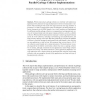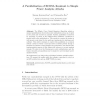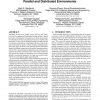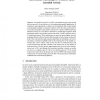158 search results - page 14 / 32 » Benefits of Processor Clustering in Designing Large Parallel... |
LCPC
2001
Springer
14 years 1 months ago
2001
Springer
While uniprocessor garbage collection is relatively well understood, experience with collectors for large multiprocessor servers is limited and it is unknown which techniques best ...
SIGMETRICS
2010
ACM
14 years 1 months ago
2010
ACM
In this paper, we consider a generic model of computational grids, seen as several clusters of homogeneous processors. In such systems, a key issue when designing efficient job al...
COMSWARE
2007
IEEE
14 years 3 months ago
2007
IEEE
The Elliptic Curve Digital Signature Algorithm admits a natural parallelization wherein the point multiplication step can be split in two parts and executed in parallel. Further pa...
SIGMETRICS
2002
ACM
13 years 8 months ago
2002
ACM
Scheduling in large-scale parallel systems has been and continues to be an important and challenging research problem. Several key factors, including the increasing use of off-the...
EUROPAR
2005
Springer
14 years 2 months ago
2005
Springer
The model of moldable task (MT) was introduced some years ago and has been proved to be an efficient way for implementing parallel applications. It considers a target application ...




